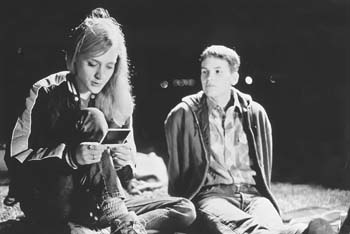![[MetroActive Movies]](/gifs/movies468.gif)
[ Movies Index | Show Times | Santa Cruz | MetroActive Central | Archives ]
Body Trap
Gender-bending 'Boys Don't Cry' tells of a true-life tragedy in the Midwest
By Don Hines
IN A SMALL NEBRASKA TOWN CLOSE TO NOWHERE, handsome Brandon Teena (Hilary Swank) falls for Lana Tisdel (Chloë Sevigny) when she drunkenly sings karaoke in a shitkicker bar. Brandon woos her with small gifts and gentle attention. He beguiles her with talk of his past in the big city (Lincoln, Neb.) and of moving to a bigger city (Memphis). This small-time romance is doomed, since Brandon Teena is a confused woman posing as an affable young man. Her story is true: Brandon charmed many residents of Falls City, Neb., in 1993, particularly Lana; when two parolees discovered Brandon's ruse, they raped her and then murdered her. The story made headlines everywhere from The Maury Povich Show to The New Yorker.
Director Kimberly Peirce's film portrays Brandon without tabloid sensationalism, and sadly without catharsis. Brandon's on the run from Lincoln, where his disguise as "Billy" was found out. He randomly hitchhikes to Falls City and is ready to turn back for a court appearance when he sees Lana (a luminous Sevigny) in the barroom light. Their star-crossed love scenes are the only poetic views in this bleak landscape. Brandon/Teena is trapped in a body she doesn't want, trapped in a state not known for its tolerance of cross-dressers, and trapped in her ignorance of a world beyond the plains where she might survive--such as San Francisco or New Orleans.
Peirce and cinematographer Jim Denault capture too well the trappings of this white-trash world: mind-numbing jobs, if any, further benumbed by liquor; everyday conflicts resolved by trips to the emergency room or jail; lives as stark as the terrain, with no future beyond the next six-pack.
Their depiction of the Midwest is the antithesis of the Great Plains Rousseau-worshipping pastoral films of director Terence Malick, in whose Days of Heaven (1979) and Badlands (1973) the Midwest is a return to a state of nature. The harsh landscape through which these fine actors move, abetted by a plainspoken script, throws the few scenes of lyricism into jarring relief. Despite Swank's brilliant disguise and Sevigny's silent-film-star opacity, the story's brutal finish delivers not a plea for self-discovery but a cautionary tale.
[ Santa Cruz | MetroActive Central | Archives ]
Copyright © Metro Publishing Inc. Maintained by Boulevards New Media.
![]()

Talk Like a Man: Male impersonator Hilary Swank (right) falls for Chloé Sevigny.
'Boys Don't Cry' (R; 116 min.), directed by Kimberly Peirce, written by Andy Bienen and Kimberly Peirce, photographed by Jim Denault and starring Hilary Swank, Chloë Sevigny and Peter Sarsgaard, opens Thursday at the Nickelodeon in Santa Cruz.
From the January 12-19, 2000 issue of Metro Santa Cruz.